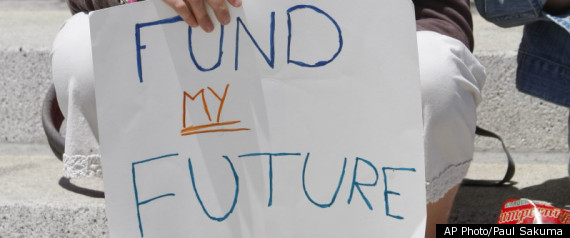‘Twas ever thus.
In the yearly drama of Shelby County Board of Commissioners’ budget hearings, schools need more money and struggle to find support and the sheriff’s request for a bigger budget gets a spirited defense.
It’s little wonder that the sheriff’s budget has grown at a rate three times greater than school funding over the past 10 years, all while education was touted as top priority by county officials.
That’s not even considering at least $237 million in county taxes waived in the past 10 years as tax incentives for private businesses that otherwise would have gone to schools.
Wait For The Facts To Form Opinions
Before Shelby County Schools Superintendent Dorsey Hopson had even had the opportunity to present his request for $35 million to the commissioners’ budget committee, some of them were already attacking it. So much for objectivity and getting all the facts before making a decision.
Chairman Terry Roland, who had shown some hopeful signs of leadership, was back to his old ways, saying, “I don’t want this to become an all-out brawl but we can’t let the county go under because of mismanagement of schools…every year, they try to tug at the heartstrings of people by using the children.”
As usual, there were no facts to back up his assertions of mismanagement, and it’s worth remembering that it was actually subsidizing sprawl and putting millions of dollars into the pockets of developers that brought Shelby County Government to the brink of bankruptcy, not school funding. And we’re hard-pressed to figure out how Mr. Hopson’s request for funding is not supposed to be about children since that’s the entire reason schools exist.
Well, it’s not always easy to apply the laws of logic have applied to legislative deliberations at all levels.
Schools Only Need 3%
Meanwhile, Commissioner David Reaves, chair of the education committee, contended that Shelby County Schools should be closing 40 to 50 schools (almost 20 schools have already been closed since 2012). According to state law, county legislators’ only power is to approve or disapprove the school district’s budget request, not to set educational policy.
In addition, it’s curious that the town school districts don’t seem to get the same level of unsolicited educational advice and scrutiny.
In an apparent move to weaken the schools’ position, the county finance director pointed out that $35 million would require a 21-cent property tax increase. Of course, that’s assuming that county government does nothing to align funding to its top priority – schools – and move funds from other operations to achieve the required budgetary level.
If you’re keeping score at home, the $35 million for schools amounts amount to just 3% of the total county budget, which suggests that if county commissioners are loathe to increase taxes to meet the needs of education, they should ask for a range of scenarios for finding the 3% in other budgets.
We don’t mean to tar every county commissioner with the same brush. For example, Commissioner Van Turner, budget committee chairman, said he is keeping an open mind and awaiting the school district’s budget before reaching any conclusions.
It’s Not Fair
Meanwhile, Commissioner Heidi Shafer asked some pointed questions to the sheriff department about Department of Justice’s continuing concerns about the treatment of incarcerated youths at Juvenile Court, but within a few days, she had modulated her concerns in the face of political blowback. That, however, should not suggest that her questions were misplaced or unreasonable.
That said, it seems more and more that the entire criminal justice “system” in Shelby County deserves more scrutiny. On Friday, Just City once again shone much-needed light on the failures of the system, reporting that an average of 230 people are being held in Shelby County Jail because they are unable to pay bail bonds of less than $5,000.
It’s worth remembering that bond is not intended to be punitive. Its purpose is to guarantee the appearance of a defendant in court. Generally, defendants are released on bail when they post 10% of the bail with a bondsman. That means that 230 people are being held in jail here because they, and their families, are unable to pay $500.
“This is the reality of the American criminal justice system,” wrote Just City. “Your ability to access cash determines the circumstances under which you make one of the most important decisions of your life. This is the money bail system. And it’s not fair.”
Guns Before Butter
In addition, Just City explained: “For most Memphians, wealth and access to cash guarantee a quick release from jail should they be arrested. But nearly 30 percent of Memphians live below the poverty line, and for a growing number of people, the inability to gather large sums of money for a bondsman or a cash bond can mean days, weeks, even years behind bars awaiting a trial or other disposition. For the vast majority of those people, the case ends when they plead guilty, often so they can be released.”
The metric provided by Just City is just one of many indicators suggesting that a dysfunctional criminal justice system is needlessly costing taxpayers more than it should, not to mention denying what it was created for – justice.
These days, the cost of criminal justice – from enforcement to incarceration – is more than half a billion dollars a year, and it seems only prudent for local government to take a step back and to consider how a more efficient, more just, and more equitable system can better serve this community.
It is of course one of the great ironies of budgeting at all levels – from local to state to federal – that there’s always more money to lock up more people. It’s things like schools and human services that attract question after question.
Often lost in these budget deliberations is the direct line that runs from lower school funding to higher criminal justice costs.
Mandates Without Money
The county budget hearings also have resurrected a subject that dominated national conferences of city and county governments in the 1990s: unfunded mandates. They are responsibilities required by state and federal government but without adequate funding to provide them.
Congress passed the Unfunded Mandates Reform Act in 1995 with the stated purpose of limiting the number of unfunded federal mandates, but its impact has been negligible. At the state level, unfunded mandates received lip service but little else during those days.
As Commissioner Roland said, when state funding is too low, it often ends up with county taxpayers subsidizing state government, particularly in the area of education. The issue originally surfaced in connection to budgets of the attorney general’s office, but ways to address the problem are limited, particularly with the lack of reluctance by the General Assembly to override any actions taken in local government
These days, there is strong evidence that state government underfunds education in Shelby County to the tune of $100 million because of lack of full funding for the state Basic Education Program (BEP).
Do What I Say, Not What I Do
Then again, Shelby County Government isn’t in the strongest position to make arguments about equity, as pointed out recently by Memphis City Councilman Edmund Ford who noted county government’s double standard for road projects inside Memphis.
In comments similar to those made by county government about state government, Council Ford said that as county taxpayers, Memphians deserved more support. He pointed out that interim Shelby County Mayor Joe Ford had approved $8.7 million in the FY11 budget for widening Holmes Road, but after Mr. Ford left office, the project was eliminated from the county capital improvement projects budget.
For decades, Shelby County Government – at a time when 85% of all county taxes were paid by Memphians – would fund major roads within the smaller towns. In the 1980s, Shelby County Government amended the formula so that it paid “only” 50% of major roads in the towns.
Former Commissioner Julian Bolton was treated as a pariah when he made a modest proposal for Shelby County to pay 50% of a road project within Memphis. His proposal was voted down, but finally, in 2002, county government eliminated its policy of subsidizing the towns’ road projects.
That’s another thing about budget hearings. There are times when financial expediency can actually be the mother of better public policy.
***
Join us at the Smart City Memphis Facebook page for daily articles, reports, and commentaries relevant to Memphis.






The Commercial Appeal reports 3 more violent deaths in Memphis over the weekend including downtown and Cooper Young area.
Memphis is the American crime capital snd not much more.
Very sad.
Over the past 30-40 years I have noticed that every year the Sheriff asks for more deputies, and I’ve never understood this with Memphis and smaller municipalities annexing population. I understand the Sheriff’s court related responsibilities but the courts have not expanded as fast?
Then, this week the Commercial Appeal had a story (the same day as Sheriff’s budget, with 33 additional deputes, was reported) that said a Sheriff’s Lieutenant and Sargent were in Memphis apprehending suspected drug dealers. This makes me wonder about overlap between Memphis Police Department and Sheriff? It also makes me wonder about how much the Sheriff augments police services in the six suburban municipalities?
On school funding, I wrote something this year about calculations I have done which show that public schools in Memphis this year are receiving a little more than $40 million less than they did before the city school system charter was surrendered. A majority of city school board members, City Council members and Memphis voters chose to go to the lower level of county funding when hey decided to give up the city system’s charter. Because of weak reporting in the media, it is not clear the Memphis voters ever understood the financial implications of the charter surrender when they voted in the referendum. Nonetheless, schools in Memphis are suffering from this situation. The Shelby County Commission traditionally has been a low funder of school operations. Why should anyone believe that that situation would change. It also is true in many other counties across the state. City and special school districts exist in a number of the state’s counties because the residents of those cities and special school districts believe that their counties do not provide sufficient funding for schools in their areas. When the area outside of Memphis elected a majority of members on the commission, most of those members did not support what county school officials at the time considered to be adequate funding for the county school system of the day. Some current commissioners and others have called for Memphis city government to provide some funding for the county school system. However. at this point, the city probably does not have any authority to appropriate any funding for county schools. And even if it does, there is a question about whether those funds would have to be shared with the suburban municipal school districts. Another point on schools to remember is that county mayors have great political influence but they have no authority or responsibility when it comes to schools.
Didn’t mean to submit the previous comment as Anonymous. It should be attributed to jcov40′